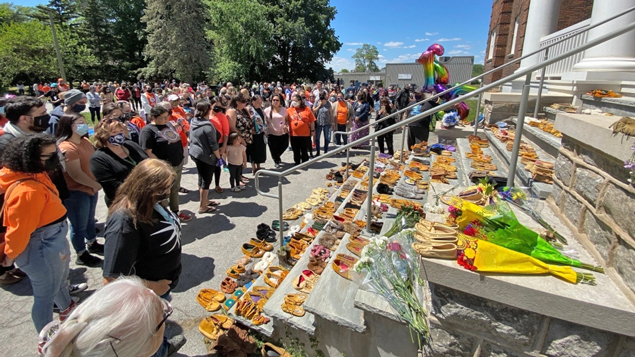Six Calls to Action In Solidarity with Indigenous Communities in Canada

215 Indigenous children at a residential school site in Tk’emlúps te Secwépemc have been found in an unmarked mass grave; some believed to be as young as three years old, and all these missing children are believed to be undocumented deaths. Indigenous communities and allies are demanding that the search continues.
Because 150,000 First Nations, Métis and Inuit children were placed in residential schools between 1870 and 1996.
Because 4,100 children are recorded as having died while attending these schools. However, former Senator Murray Sinclair, who chaired the Truth and Reconciliation Commission (TRC), said he believes the death count could be 5 to 10 times higher due to the schools’ poor burial records.
Because while 1300 different types of schools across Canada have been identified that Indigenous children were sent or attended, only 139 residential schools were documented as part of the TRC.
The discovery of these children has been horrifying, shocking, saddening and traumatic. It has left many wondering what can we do?
- Remember these children and other lives lost in the residential school system. Lighting a candle, performing a smudge, wearing an orange shirt, putting a pair of shoes or teddy bear on your doorstep, are just a few ways. Honour these and the other lives lost in the residential school system in a way that resonates with you, your traditions or beliefs. But don’t stop there.
- Call on the federal government to take up Calls to Action 71-76 and perform searches at other residential schools, to locate other missing children and establish a register. Over six years ago, the TRC acknowledged that the number of deaths in residential schools is likely significantly higher than what is officially known. In the 94 Calls to Action, 6 of them are regarding missing children and burial grounds. Calls to Action 71-76 ask the federal government to accurately detail the number of children who died, to establish a National Residential School Student Death Register, and to locate the bodies of children who died so that they can be properly memorialized.
- Listen to Indigenous voices and stories. To the TRC, reconciliation is about establishing and maintaining a mutually respectful relationship between Aboriginal and non-Aboriginal peoples in this country. In order for that to happen, there has to be awareness of the past, acknowledgement of the harm that has been inflicted, atonement for the causes, and action to change behavior.
- If you have not familiarized yourself with it already, we here at CMAW encourage you to read the TRC Report and Calls to Action and make them a priority, as Canadian citizens.
- You can donate: https://www.irsss.ca/donate
- Also, yourself, or your indigenous friends, family members, and coworkers may not be ok. Reach out to support them as you are able or reach for support as you need.
A 24-hour national Indian Residential School Crisis Line is available to provide support to former students and those affected. People can access emotional and crisis referral services by calling: 1-866-925-4419.
Additional Health Support Information:
Emotional, cultural and professional support services are also available to Survivors and their families through the Indian Residential Schools Resolution Health Support Program. Services can be accessed on an individual, family or group basis.
Nova Scotia, New Brunswick, Prince Edward Island, Newfoundland and Labrador: 1-866-414-8111
Quebec: 1-877-583-2965
Ontario: 1-888-301-6426
Manitoba: 1-866-818-3505
Saskatchewan: 1-866-250-1529
Alberta: 1-888-495-6588
British Columbia: 1-877-477-0775
Yukon, Northwest Territories and Nunavut: 1-800-464-8106
